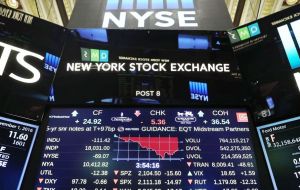MercoPress. South Atlantic News Agency
Algorithmic trading accelerated Black Monday markets plunge, speculate analysts
 Such automated trading almost certainly accelerated the sell-off on Monday, which saw the Dow Jones Industrial Average crashing 800 points in ten minutes.
Such automated trading almost certainly accelerated the sell-off on Monday, which saw the Dow Jones Industrial Average crashing 800 points in ten minutes.  Algorithmic trading has become so ubiquitous that some estimate well over half of all trading of the S&P 500 Index is done this way.
Algorithmic trading has become so ubiquitous that some estimate well over half of all trading of the S&P 500 Index is done this way. Robot trading has accelerated this week's market dive and may have sparked the sell-off, experts say. Financial firms use computers programmed with complex sets of instructions known as algorithms, which identify trading opportunities and then strike faster than any human could.
Algorithmic trading has become so ubiquitous that some estimate well over half of all trading of the S&P 500 Index is done this way.
Such automated trading almost certainly accelerated the sell-off on Monday, which saw the Dow Jones Industrial Average crashing 800 points in ten minutes.
“The explosive speed of the fall ... that is done by machines,” said Tom Stevenson, Investment Director at Fidelity Personal Investing.
Most analysts believe the market tumble was prompted by a report on the US job market, released on Friday, which showed strong wage growth. But the decision to sell on that news may have been made by robot traders. US government bonds, or Treasuries, fell in value after the US jobs report. Yields (the interest that bonds offer investors) rise as prices fall.
It's thought that robot traders were waiting for that yield to hit 3% - a significant figure as it could prompt human investors to switch out of shares into bonds.
Mr Stevenson said: “Everyone looks for a reason for why the fall happened. One of them was that bond yields rose up towards the magic number of 3%. There seems to have been a trigger at 2.9% for automatic trading to sell and once that trigger was pulled the markets went into freefall.”
Piers Curran, head of trading at Amplify Trading, explained that algorithms will be set up to react in certain ways to certain situations.
“One might work by a stop loss criteria, selling an asset as it falls to prevent further losses. So if the Dow Jones Index has dropped 5% it may trigger the machine to sell, but if you have a huge number of these algorithms hitting stop losses at the same time that produces further falls which produce further stop losses”, said Curran.
The algorithmic trading can also be triggered by “correlation” trades, when movement in one market will trigger a trade in a different market.
Last week an Index called the VIX, nicknamed the Fear Index because it measures stock market volatility, started to rise sharply.
Currant added: “The VIX was very elevated last week, and doubled on Monday, and because there is often an inverse correlation between the VIX and the Dow Jones Index, the machine trades sold US equities.”
The triggers though can work in the opposite direction. Many of the algorithms that sold equities on Monday were “selling short”, that is selling stocks specifically to buy them back cheaper later and net a profit. Steep market falls created by algorithms can create equally steep recoveries.
Mr Curran said: “The markets were reacting to some very specific numbers on Monday, but they are only one set of figures.
”We are going to have to see wages growing strongly in February too and get at least four rises in interest rates this year before we can be sure inflation is going to be that much higher.
“The market reaction to these single numbers was massively exaggerated because of the machine trades.”
Mr Stevenson agreed: “Algorithmic trading or quant trading does make markets more volatile.” But longer term Stevenson is not pessimistic. “There are two things that can cause a proper bear market - interest rates rising faster than expected, or a recession”
“Rates may rise a little faster but not excessively so. As for a recession, all the evidence, bearing in mind the strength of the US economy, is against it”. (BBC)




Top Comments
Disclaimer & comment rulesCommenting for this story is now closed.
If you have a Facebook account, become a fan and comment on our Facebook Page!